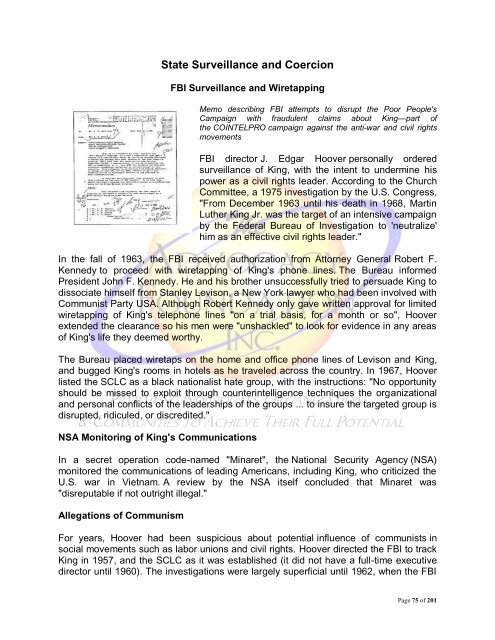You also want an ePaper? Increase the reach of your titles
YUMPU automatically turns print PDFs into web optimized ePapers that Google loves.
State Surveillance and Coercion<br />
FBI Surveillance and Wiretapping<br />
Memo describing FBI attempts to disrupt the Poor People's<br />
Campaign with fraudulent claims about King—part <strong>of</strong><br />
the COINTELPRO campaign against the anti-war and civil rights<br />
movements<br />
FBI director J. Edgar Hoover personally ordered<br />
surveillance <strong>of</strong> King, with the intent to undermine his<br />
power as a civil rights leader. According to the Church<br />
Committee, a 1975 investigation by the U.S. Congress,<br />
"From December 1963 until his death in 1968, Martin<br />
Luther King Jr. was the target <strong>of</strong> an intensive campaign<br />
by the Federal Bureau <strong>of</strong> Investigation to 'neutralize'<br />
him as an effective civil rights leader."<br />
In the fall <strong>of</strong> 1963, the FBI received authorization from Attorney General Robert F.<br />
Kennedy to proceed with wiretapping <strong>of</strong> King's phone lines. <strong>The</strong> Bureau informed<br />
President John F. Kennedy. He and his brother unsuccessfully tried to persuade King to<br />
dissociate himself from Stanley Levison, a New York lawyer who had been involved with<br />
Communist Party USA. Although Robert Kennedy only gave written approval for limited<br />
wiretapping <strong>of</strong> King's telephone lines "on a trial basis, for a month or so", Hoover<br />
extended the clearance so his men were "unshackled" to look for evidence in any areas<br />
<strong>of</strong> King's life they deemed worthy.<br />
<strong>The</strong> Bureau placed wiretaps on the home and <strong>of</strong>fice phone lines <strong>of</strong> Levison and King,<br />
and bugged King's rooms in hotels as he traveled across the country. In 1967, Hoover<br />
listed the SCLC as a black nationalist hate group, with the instructions: "No opportunity<br />
should be missed to exploit through counterintelligence techniques the organizational<br />
and personal conflicts <strong>of</strong> the leaderships <strong>of</strong> the groups ... to insure the targeted group is<br />
disrupted, ridiculed, or discredited."<br />
NSA Monitoring <strong>of</strong> King's Communications<br />
In a secret operation code-named "Minaret", the National Security Agency (NSA)<br />
monitored the communications <strong>of</strong> leading Americans, including King, who criticized the<br />
U.S. war in Vietnam. A review by the NSA itself concluded that Minaret was<br />
"disreputable if not outright illegal."<br />
Allegations <strong>of</strong> Communism<br />
For years, Hoover had been suspicious about potential influence <strong>of</strong> communists in<br />
social movements such as labor unions and civil rights. Hoover directed the FBI to track<br />
King in 1957, and the SCLC as it was established (it did not have a full-time executive<br />
director until 1960). <strong>The</strong> investigations were largely superficial until 1962, when the FBI<br />
Page 75 <strong>of</strong> 201

















